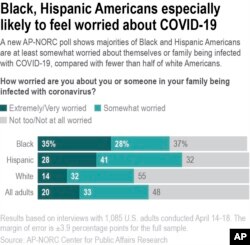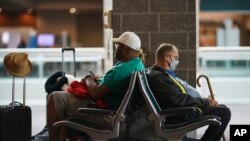Black and Hispanic People stay way more cautious of their strategy to COVID-19 than white People, latest polls present, reflecting diverging preferences on how one can take care of the pandemic as federal, state and native restrictions fall by the wayside.
Regardless of majority favorability amongst U.S. adults general for measures like masks mandates, public well being consultants stated divided opinions amongst racial teams mirror not solely the unequal influence of the pandemic on individuals of shade but in addition apathy amongst some white People.
Black People (63%) and Hispanic People (68%) proceed to be extra possible than white People (45%) to say they’re not less than considerably anxious about themselves or a member of the family being contaminated with COVID-19, in line with an April ballot from The Related Press-NORC Middle for Public Affairs Analysis.
All through the pandemic, Black and Hispanic communities have skilled larger charges of sickness and dying from COVID, stated Amelia Burke-Garcia, public well being program space director at NORC. These experiences have resulted in higher ranges of stress, anxiousness and consciousness of the dangers of catching COVID-19, she stated, which implies individuals of shade usually tend to really feel measures like masks mandates are wanted.
“We have seen these developments endure all through all the pandemic,” Burke-Garcia stated. “What we’re seeing now as mitigation measures are being rolled again is there’s nonetheless nice concern amongst Black People and Hispanic People across the threat of getting sick.”
Seventy-one % of Black People say they favor requiring face masks for individuals touring on airplanes, trains and different kinds of public transportation. That is greater than the 52% of white People who help masks mandates for vacationers; 29% of white People are opposed. Amongst Hispanic People, 59% are in favor and 20% are opposed. The ballot was carried out earlier than a ruling by a federal choose scuttled the federal government’s masks mandate for vacationers.
In Indiana, Tuwanna Plant stated she sees fewer and fewer individuals carrying masks in public, despite the fact that she stated she has been diligent in at all times carrying one. Plant, who’s Black, stated she sees individuals treating the pandemic prefer it’s over, and she or he needs the masks mandate to proceed.
Plant, a 46-year-old sous chef, stated she had some considerations about getting the vaccine and took each different precaution, comparable to cleansing and masking, to keep away from getting sick however not too long ago was hospitalized for COVID-19.
The expertise scared her — she has a preexisting lung situation, and knew members of the family who died from COVID-19. She stated she plans to get vaccinated as quickly as she will.
“I known as my kids whereas I used to be within the emergency room,” Plant stated. “I did not know … if it was going to get higher or worse, I did not know. So it was the expertise for me altogether.”
Dr. Celine Gounder, an infectious illness specialist and epidemiologist and editor-at-large at Kaiser Well being Information, stated individuals’s lived experiences deeply form how they understand the pandemic. Anecdotes and private expertise can have a bigger influence on conduct than numbers, she stated, and folks of shade usually tend to have had unfavorable experiences with well being care previous to and through the pandemic.
Whereas new medicines and vaccines have made it simpler to deal with COVID-19, Gounder stated many individuals nonetheless face systemic obstacles to accessing that medical care. Others threat shedding their jobs or are unable to take day off in the event that they do fall ailing, she stated, or can not keep away from issues like public transit to cut back their exposures.
“When individuals argue that they do not must masks on the airplane, meaning one thing very completely different for somebody who has entry to all of those new improvements than it does for any person who has no medical health insurance, who struggles to look after an aged father or mother and their kids, who’s perhaps a single mother working in a job the place she has no paid sick and household medical go away,” Gounder stated. “It is only a fully completely different calculation.”
In January, an AP-NORC ballot confirmed Black and Hispanic People had been extra possible than white People to really feel sure issues can be important for getting again to life with out feeling vulnerable to an infection. For instance, 76% of Black People and 55% of Hispanic People stated it was important for getting again to regular that most individuals repeatedly put on face masks in public indoor locations, in contrast with 38% of white People.
Final month, an AP-NORC ballot confirmed Black and Hispanic People, 69% and 49%, had been extra possible than white People, 35%, to say they at all times or typically put on a face masks round others.
Decrease help for masks mandates and different precautions amongst white People can also mirror much less sensitivity in direction of what happens in communities of shade. In a 2021 research of masks carrying through the early a part of the pandemic, researchers discovered that masks carrying amongst white individuals elevated when white individuals had been dying at higher charges within the surrounding neighborhood. When Black and Hispanic individuals had been dying, masks utilization was decrease.
Berkeley Franz, a co-author of the paper, stated that along with residential segregation that separates white individuals from communities of shade, previous analysis has proven that white individuals can show ambivalence towards insurance policies that they imagine largely assist individuals of shade.
“Anti-Blackness is admittedly pervasive and has super penalties, each when it comes to the insurance policies that get handed, and what does not,” Franz stated. “White individuals can nonetheless have actually racist actions with out seeing themselves that means and understanding the implications. It is largely beneath the floor and unintentional however has super penalties when it comes to fairness.”
Communities of shade even have a special notion of threat from the pandemic than their white counterparts, stated Michael Niño, a sociology professor on the College of Arkansas who co-authored a paper on race, gender and masking within the pandemic.
“Masking is one thing that’s comparatively low-cost, it is efficient, and it is one thing that may be simply achieved,” he stated. “It does not require any kind of governmental response. These broader histories of racism and sexism in america are most definitely shaping a number of the patterns we’re seeing.”
The AP-NORC ballot of 1,085 adults was carried out April 14-18 utilizing a pattern drawn from NORC’s probability-based AmeriSpeak Panel, which is designed to be consultant of the U.S. inhabitants. The margin of sampling error for all respondents is plus or minus 3.9 share factors.








